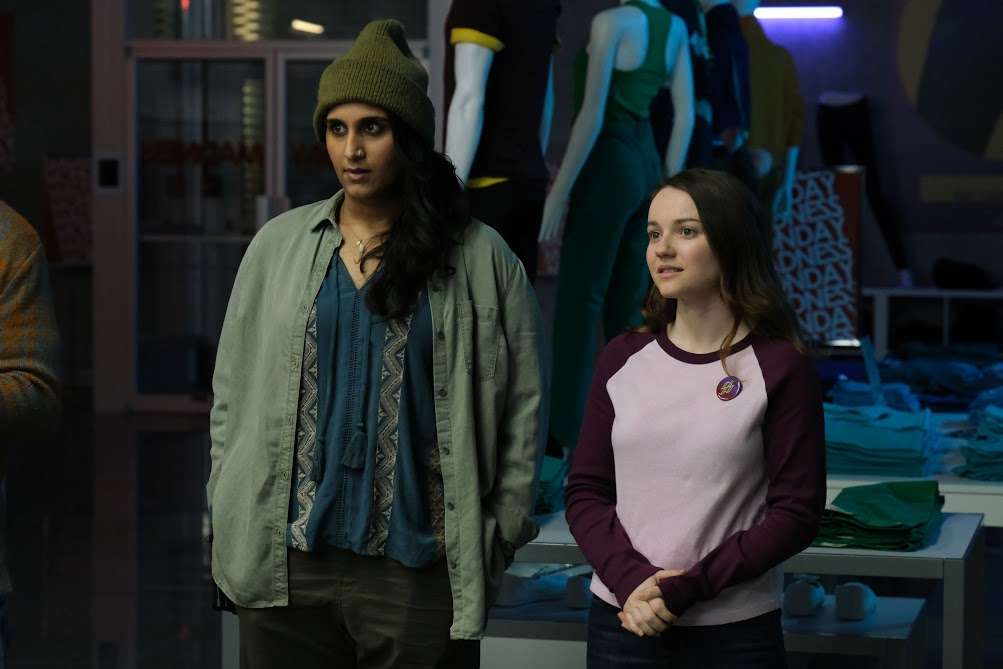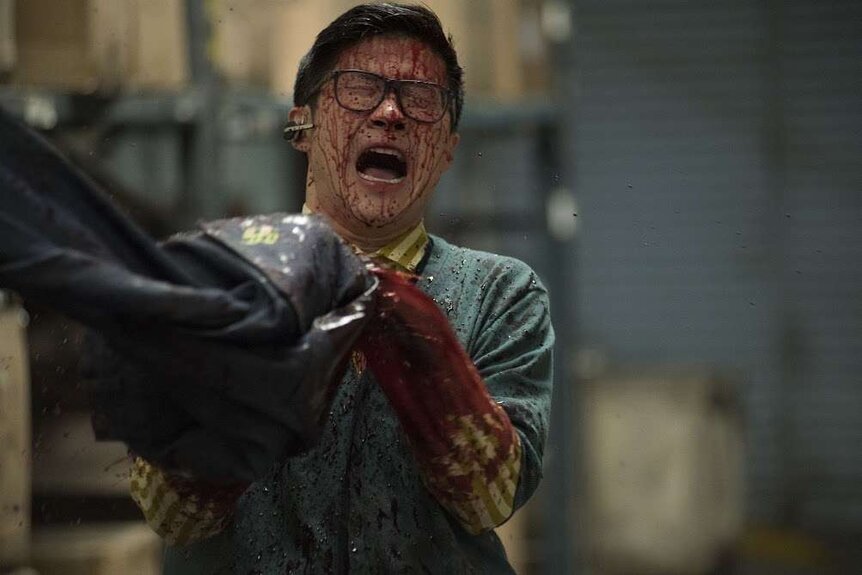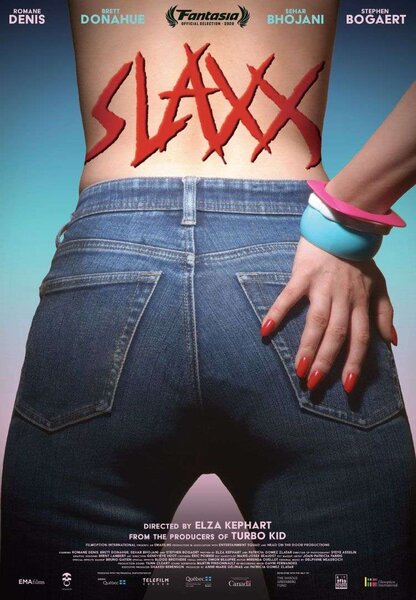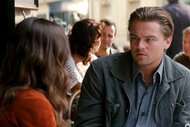Create a free profile to get unlimited access to exclusive videos, sweepstakes, and more!
Slaxx director Elza Kephart on killer jeans and political horror

When you see a pair of truly gorgeous jeans, you might think, "Those are to die for." Well, what if they were? That's the twisted curiosity explored in the stylish slasher-comedy Slaxx.
The Canadian indie making its world premiere at the Fantasia International Film Festival centers on a trendy clothing store, where the chic clerks are working overnight to ready for the release of a new line of jeans. But there's something deadly about this denim. One by one, it begins slaughtering the sales team and slurping up their blood. To stop the massacre, the newest hire (Romane Denis) must uncover what these carnage-craving jeans are after.
We're gaga for Slaxx. So to toast its Fantasia debut, SYFY FANGRRLS sat down with the film's co-writer/director Elza Kephart, who revealed the film's silly origins, political intention, and the secrets of its denim monster.
The idea for this outrageous horror offering sparked 15 years ago, while Kephart was on a road trip with Slaxx co-writer Patricia Gomez. "We were really behaving like irritating siblings," Kephart recounted. "And irritating each other with the words that we really hate. She hated the word 'slacks.' So, I just repeated it over and over. And it just sounded so evil."
Kephart dropped the octave of her voice to create a spooky tone as she said, "Slaaaacks! Slaaaaaacks!" Amid this goofing about, the idea was born. "I turned to Patricia and I was like, 'This sounds like killer pants — with two X's!'"
Gomez agreed and the two tossed around ideas for a movie about killer slaxx. "At first it was not at all about fast fashion," Kephart said. "It was just this stupid teenage horror film. But the idea of the killer pants was just so awesome that it carried us through another couple of drafts until we really found what it was about."
The women found inspiration for their script in various jobs over the years. Gomez's long-ago gig at The Gap influenced the corporate culture on display in Slaxx's tragically hip flagship store. Kephart's experience as a receptionist and working with filmmakers who favored "corporate speech" shaped characters and dialogue.
"It's like the idea knew where it had to go," she mused. "It was waiting for us to catch up with it."
As the drafts developed, Gomez and Kephart dug into the idea of using the killer jeans as a means of satirizing the horrors of fast fashion and consumerism. The latter is an issue that's concerned Kephart since she was young. "At about 10 or something, I was really aware of how business shapes our minds and basically brainwashes us," she began. "I remember everyone buying a Cabbage Patch Kid. I really resisted buying a Cabbage Patch Kid because I could tell we were being brainwashed. But I felt so out of it because I didn't have a Cabbage Patch Kid. Then, my mother gave me one for my birthday. And I remember the horrible feeling of being happy that I had one because now I was like everyone else, but feeling I had betrayed my own sense of what I knew deep down was right."
As an impassioned climate change advocate, Kephart tied the issue of consumerism to environmental threat. She explained how explosive makers after World War II reconfigured their factories to mass-produce cleaning products. "So, they convinced us that you need your house to be super clean and [to buy] all this stuff that we don't need," she continued. "And producing it is destroying the earth and people and lives and just exploiting everything, all so these monsters can make money. We are being told to buy sh*t — not for our own good — but for the corporate overlords' pocketbook."
Spoilers for Slaxx: the killer jeans may be the movie's monster. But they are not the movie's villain. Kephart said, "As I was making Slaxx, everything we were fighting against, it all came together. So I think it's a lifetime's worth of accumulation of how corporations are just these really evil entities. And the epitome to me is fast fashion because you don't need that many clothes. We just don't."
Still, Kephart understands the allure of new clothes. She wanted audiences to feel that as they looked upon her slasher-slaxx. So, she sought a like-minded partner for their construction. "I really wanted the pants to come from a real ethical place," she explained. "So we did find an ethical jean maker in Montreal called Naked and Famous Denim."
Because Naked and Famous Denim employs raw denim, the jeans they delivered were surprisingly stiff. However, this proved an inspiration in the characterization and physicality of the monster jeans. "When we actually saw the pants, they looked quite menacing because of the pockets," Kephart recalled. In the film, the back pockets of the unworn jeans serve as glaring eyes, while the opening the waist becomes a very big mouth, all the better to eat you with!
From there, Kephart and her team had to figure out how these jeans would move. "It was just a matter of playing with them with the puppeteer and the special effects guys, testing out different moves," she said. "They had a lot of different rigs for all the different moves. And so we just workshopped until we found different faces. They use their hands [to puppet] the eyes and the mouth." Speaking to the creature's evolution within the film, she said, "I really wanted to give it an animal-like feeling when it slithers and when it slurps [blood]. I thought at first it comes into being as this animal entity and then gradually as it absorbs blood becomes more humanoid and stands on its own two legs." While the movie may get silly in its concept, the goal for its titular creature was "to be super badass."
Asked what draws her making horror movies, Kephart considered, "I always really liked stories where people died. Ever since I was a kid, I loved Agatha Christie. The Baby-Sitters Club, I was like, 'That's boring, no one dies in it.' I really always was really drawn to mystery, to horror. I really liked Anne Rice, vampires, witches, anything supernatural."
After some further thought, she added, "I think it's the mythical aspect, the really primal aspect, being able to use symbolism, metaphor. I'm not interested that much in reality. I'm interested in the grand themes. And I feel horror actually lends itself really well to that because you're always talking on two levels. There's an interesting tension between this grotesque visceral blood and then this is more grandiose themes that we can explore in a symbolic way."
With a shrug and a grin, she concluded, "I like being in a dreamlike atmosphere."
Slaxx has been acquired by Shudder. So once its run at Fantasia — and upcoming festivals — has drawn to a close, you can look for it on the streaming platform.




























